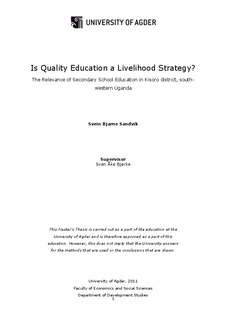| dc.description.abstract | This research addresses the secondary school education‘s impact on people‘s livelihood strategies in Kisoro district, south-western Uganda. Currently, approximately 80 percent of households in the district use agricultural livelihood strategies to produce food and generate income. Most parents want their children to attend secondary school. Historic events have impacted Ugandans‘ attitudes towards the rural lifestyle and livelihood strategies. Furthermore, past events resulted into a school system dominated by academic subjects and teacher-centeredness encouraging cramming of information rather than independent and critical thinking. Today, students can freely choose among vocational subjects in addition to the academic requirements. Secondary school education is a platform of knowledge and competence for students to rely on later when making a living. The objectives of this study are to explore the Quality of secondary school education in Kisoro district, and to examine its usefulness for local livelihood strategies. Furthermore, the Quality Education and Sustainable Livelihoods frameworks are combined to identify the contextual settings in the study area, to discover the current role of secondary school education, and to understand how secondary school education can assist people in bringing positive change. A mixed methods approach has been used for data collection. The findings show that stakeholders in secondary school education regarded enabling inputs and outcomes as indicators of Quality Education. The majority of participants believed secondary school education was important for socio-economic development. Evidently, the most used teaching practises in secondary schools were teacher-centred as a time-saving factor, or because child-centred methods were misinterpreted. The subject content was largely non-contextualized, and the quality of vocational subjects was affected by the dominance of theoretical instruction as opposed to practical training. The majority considered poverty to be widespread in Kisoro district due to the dominance of subsistence farming. This livelihood strategy was impacted by a vulnerability context. Respondents recognized the potential of secondary school education to assist students in becoming self-sustained and less vulnerable to socio-economic and environmental trends, shocks and seasonal changes. However, due to teaching and learning strategies, limited subject contextualization and parental involvement, and inadequate infrastructure and materials, the potential of secondary school education to bring positive change to livelihood strategies is underutilized. | no_NO |
